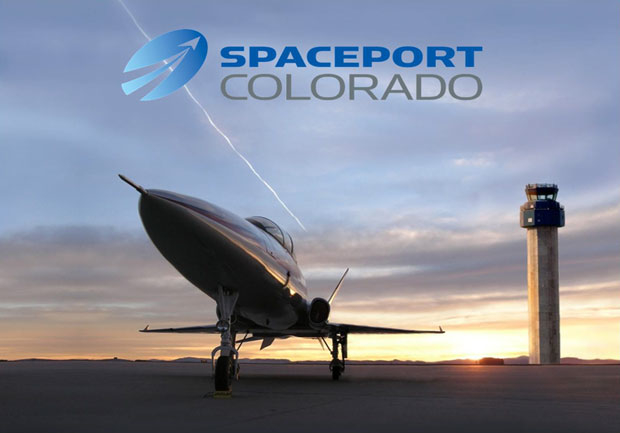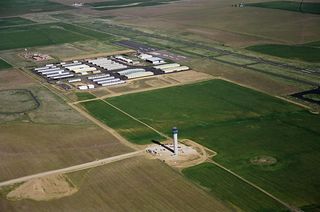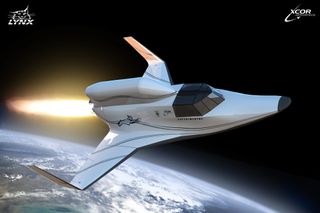Potential Colorado Spaceport Plan Gaining Steam

Colorado’s mile-high altitude and welcoming attitude could bring a commercial spaceport to the Rocky Mountain state.
Now being eyed as home of the Colorado Spaceport is the Front Range Airport in the city of Aurora, Colo., a site that sits on 4,000 acres (1,619 hectares) of landand is surrounded by 6,000 acres (2,428 hectacres) of nonresidential, privately owned industrial property.
Some Colorado officials are pushing for a spaceport to keep the state engaged in the commercial space industry. If spaceport designation is granted, the next step would be upgrading the Front Range Airport to support space travel. Advocates envision the spaceport handling suborbital space planes and serving as one hub of a worldwide network of suborbital point-to-point travel.
At present, Alaska, California, Florida, New Mexico, Oklahoma, Texas and Virginia are designated spaceport states. [Top 10 Private Spaceships of the Future]
Letter of intent
Last December, Colorado Governor John Hickenlooper announced that the state had taken the first step toward becoming a spaceport state by declaring its intent in a letter to the Federal Aviation Administration’s (FAA) Office of Commercial Space Transportation (AST).
Hickenlooper said the effort would help expand Colorado’s competitiveness in the aerospace industry by developing new opportunities for the state to engage in the future growth of commercial space transportation.
Get the Space.com Newsletter
Breaking space news, the latest updates on rocket launches, skywatching events and more!
In early February of this year, a letter of unanimous support from the full Colorado congressional delegation was sent to the AST that endorsed Front Range Airport as the state’s spaceport.
"A spaceport [allows] us to conceive of flying to Australia in a couple of hours … and that really does begin to revolutionize how we think about, not just travel, but how we do business," Hickenlooper said during an April 19 talk at the 28th National Space Symposium in Colorado Springs. [Vote Now! The Best Spaceships of All Time]

Limiting legal exposure
At the symposium, Hickenlooper signed Senate Bill 12-035 — a measure sponsored by Colorado State Senator Mary Hodge and Colorado Representative Bob Gardner — that limits legal exposure for companies conducting spaceflights at the prospective facility.
That piece of legislation, in part, grants limited liability to spaceflight companies, allowing spaceflight participants who sign waiver forms to sue only if they are injured or killed as a result of a firm’s "willful or wanton disregard" for safety.
"The potential of horizontal take-off commercial spaceflight facilities in Colorado would soon position Colorado as the hub of civilian spaceflight activities in the country, similar to the status held by Cape Kennedy and Houston," the bill states.
In followup action, a trio of architectural firms has been shortlisted this month in response to a Front Range Airport Request for Qualifications for spaceport consultants.
Spaceport status
Dennis Heap, executive director of the Front Range Airport, is a veteran in the regional airline business. He has managed the airport for the last 18 years and is a leading champion of the site being given spaceport status.
"Airports are changing the way they do business, because outside pressures have dramatically changed airports — specifically, general aviation airports," Heap told SPACE.com.
Heap noted that, over the past years, the number of takeoffs and landings at Front Range Airport has certainly seen its ups and downs.
'Once-in-a-lifetime opportunity'
"Last year, our traffic was at 21 percent of our runway capacity," Heap said. "Under normal conditions, a facility that is grossly underutilized would not have a good future. However, Front Range Airport weaknesses are now seen as a strength, giving us a once-in-a-lifetime opportunity to become a spaceport."
Front Range has excess capacity that could be used for unconventional vehicles like space planes and unmanned aerial vehicles, Heap noted. The Front Range airport is fairly remote, yet conveniently close to Denver International Airport (DIA), which is the world's 10th-busiest. It's also within commuting distance for the skilled workforce that lives in the Denver metropolitan area, he said.
"Spaceport Colorado has the full support of the governor, the entire Colorado congressional delegation and DIA," Heap said.
Heap said that in his 38 years of aviation experience, he has not experienced anything as exciting or energizing as "New Space."

Wanted: Customer base
"A spaceport here in Colorado could make a ton of sense, but only if done right," said Jonathan Goff, president and CEO of Altius Space Machines in Louisville, Colo.
"The key is going to be finding a way to diversify so they’re not dependent on winning business from just one or two customers," Goff told SPACE.com. "It sounds like some of the people trying to make this spaceport happen are moving in that direction."
Goff said that the key is going to be finding out how to work with the FAA to allow suborbital rocket flights within the Class B airspace around DIA, without having to close the airspace.
"Colorado is a nice place to live, and has plenty of advantages, but they’re only going to get customers out here if they can get things worked out with the FAA in a way that allows those customers the freedom to operate," Goff said.
Focus issues
Any focus on suborbital point-to-point travel is premature, Goff advised. The technology needed to support that spaceport activity, "while not truly impossible, is also really, really hard," and isn’t going to happen anywhere near as soon as is being presented, he said.
"The regulatory and logistical challenges — remember, you need a spaceport on both ends of every suborbital point-to-point route— are going to take a while to address," Goff said.
Even if the Colorado spaceport idea comes to fruition, Goff added, the focus on horizontal takeoff and landing vehicles is going to exclude several vertical takeoff and landing (VTVL) companies, like Masten Space Systems and Armadillo Aerospace.
"If Colorado could find a way to accommodate VTVL companies as well, that would be even better…and could likely bring some of that business to the state as well," Goff said.
Challenging job
The prospect of a Colorado spaceport is a healthy signal, said Christine Anderson, executive director of the New Mexico Spaceport Authority, which oversees Spaceport America, the world's first purpose-built commercial spaceport.
"I think it is an excellent sign for the commercial space industry that we are seeing great interest in additional spaceport development projects," Anderson said. "Our experience is relevant to building a spaceport literally from the ground up. Others may have a different experience in repurposing existing facilities."
As for advice to prospective spaceport developers, Anderson added: "Whichever path you are pursuing, I would just say, it will be a challenging job … but one with great opportunities and rewards for the individual states and for our nation."
Leonard David has been reporting on the space industry for more than five decades. He is a winner of last year's National Space Club Press Award and a past editor-in-chief of the National Space Society's Ad Astra and Space World magazines. He has written for SPACE.com since 1999.
Join our Space Forums to keep talking space on the latest missions, night sky and more! And if you have a news tip, correction or comment, let us know at: community@space.com.

Leonard David is an award-winning space journalist who has been reporting on space activities for more than 50 years. Currently writing as Space.com's Space Insider Columnist among his other projects, Leonard has authored numerous books on space exploration, Mars missions and more, with his latest being "Moon Rush: The New Space Race" published in 2019 by National Geographic. He also wrote "Mars: Our Future on the Red Planet" released in 2016 by National Geographic. Leonard has served as a correspondent for SpaceNews, Scientific American and Aerospace America for the AIAA. He has received many awards, including the first Ordway Award for Sustained Excellence in Spaceflight History in 2015 at the AAS Wernher von Braun Memorial Symposium. You can find out Leonard's latest project at his website and on Twitter.